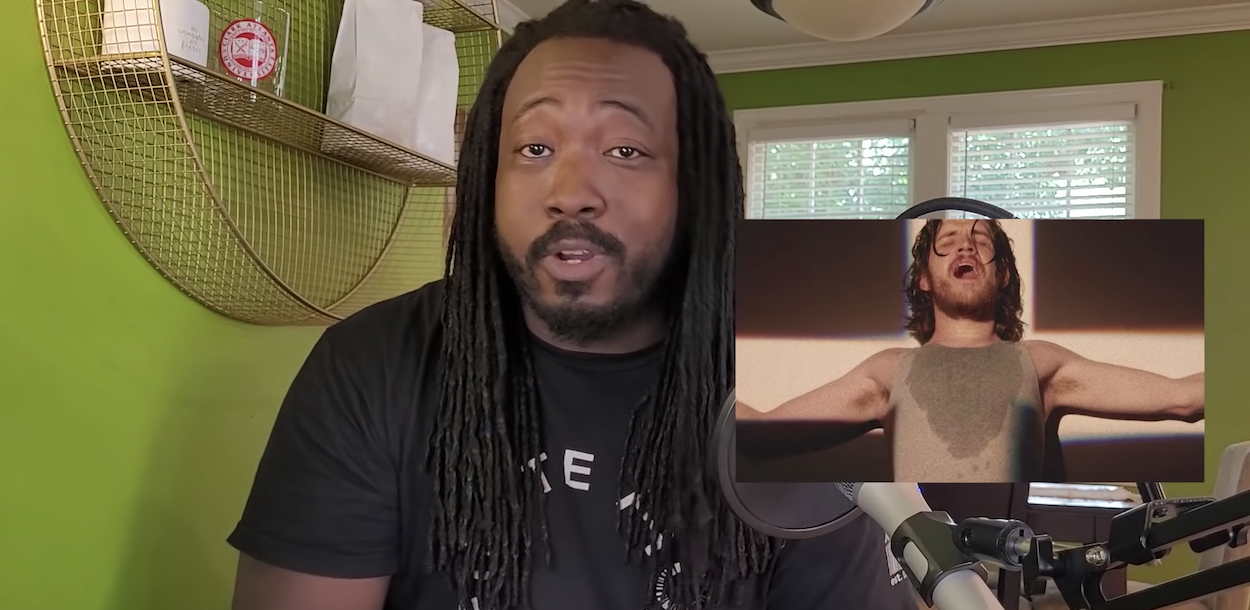“Bo Burnham's INSIDE and ‘White Liberal Performative Art’”
There should be real concern when fighting for justice becomes a fad. Obviously, anything that can bring horribly inequalities to light for a broader audience is technically a good thing; the more people see something, the more they may discuss it, the more likely that something may change. Sometimes. Kind of.
But bringing real change is process that will take longer than a topic stays trending. How many (not Black) people who posted about Black Lives Matter in 2020—or even marched in the streets during those protests—have left that issue behind? If something isn’t immediately affecting you every day, then it’s easy for that issue to be crowded out by the hectic demands that life heaps on people. So while there was a lot of discussion about systemic racism, videos made covering the history of societal inequity, and copies sold of Between The World And Me in 2020, did any of it stick? Was that moment of white people acknowledging privilege and identifying their (varying degrees of tacit) participation in a racist culture simply an era signifier like the “Ice Bucket challenge”? Did real desire for change take root in white people’s minds? How do they react to their involvement in all of this and how can they act going forward?
It’s heady stuff that F.D. Signifier brings up in his latest “Black Media Breakdown” video essay that was posted on August 13, 2021. “Bo Burnham’s INSIDE and and ‘White Liberal Performative Art’” uses the acclaimed Netflix special from multi-hyphenate to examine how average cishet white dudes experience the moment of realizing not just that the country is fucked up for not-white people, and not just that they have contributed to that shittiness in the past, but also that they are directly benefitting from it still. There’s the anger over a horrific situation, the guilt over ones own actions, and the uncertainty of what to do about all of it.
Signifier does an outstanding job using media studies, American history, cultural studies, and his own humanity to see how this situation plays out in INSIDE. Burnham experiences this cycle within the special, but leaves it mostly as open-ended questions that he’s not certain how to answer. Which, as Signifier points out, is good and bad: the question can’t be answered in only one way for everyone and it’s up to each white person to grapple with this; but it’s not great to acknowledge it without putting in more work. It’s the equivalent of the “black square on Instagram” phenomenon where folks have a good intention but no real effort into contributing to change.
It helps that INSIDE is a mixture of topics and tones that covers mental health, technology, race, gender, COVID, and more with catchy songs, solid jokes, and compelling emotional moments. But is it just a show? Is this simply a fairly prominent white guy (at least, prominent to other white people as it becomes clear that Burnham is not particularly well-known in the Black community) whipping himself in the town square to be considered one of the good ones? It’s hard to say and F.D. Signifier wrestles with this question as well, not just in terms of INSIDE but other slacktivism and attempted demonstrations of understanding from supposed white allies.
I love INSIDE because I think it covers a wide gamut of social and emotional beats in a unique way. Though a lot of it could be kayfabe, cameras just happening to roll at the right moment or whatever. But, assuming it’s real, it resonated with me as I’m a basic cishet white dude from Massachusetts as well who is only eight years older than Burnham. Of course I’ve not only benefited from America’s crooked system but have certainly participated in comedy or acts that contributed to a culture of shittiness. And this isn’t like the distant past—three years ago I stepped out of my lane to proclaim that Wes Anderson’s ISLE OF DOGS wasn’t appropriating Japanese culture. Fun fact: I’m a moron. I was deservedly taken to task and still feel awful about my arrogance. But the question remains is how can you help a situation where your very existence technically contributes to the problem? That’s where Signifier sees the emergence of an existential dread of white guys who are “awakening” to this reality.
It’s a great video essay and I desperately hope Bo Burnham watches it and the two can have a discussion on the topic—it would be fascinating. My lone ‘critique’ is a lack of broader scope in Signifier’s assessment. Because the special is viewed through the lens of race it elides that INSIDE points out how the vast majority of those in America still benefit off terrible systems in other countries (sweatshop workers and other third world citizens that prop up the niceties of modern life in the United States). This indictment crosses many socioeconomic, gender, sexuality, and racial groups using their iPhone or some other commodity built on the backs of impoverished people in other countries. Still, not every essay can address every facet of a work—nor should it.
But viewing INSIDE through how white people react to their role in maintaining the status quo in terms of Black people and Black culture is a fascinating meditation and absolutely deserving of your time and energy. If interested/able, please consider supporting F.D. Signifier on Patreon.


